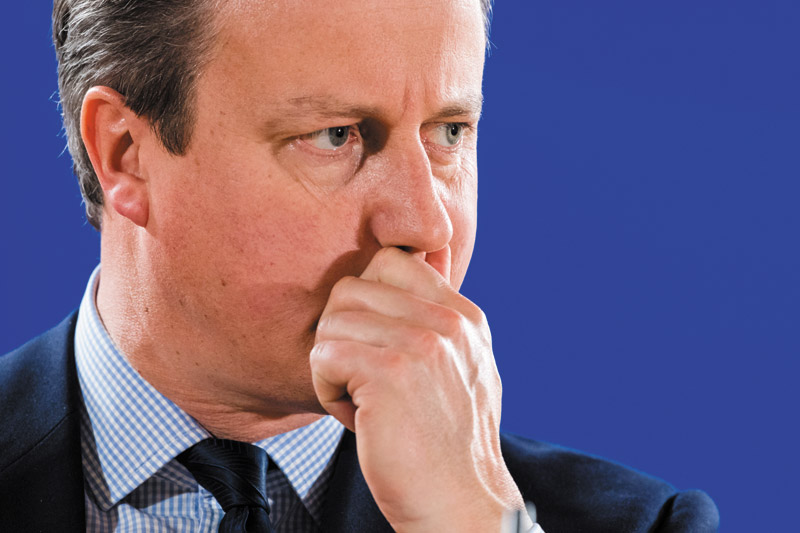Brexit What’s It?
A week later, a Britain still broken.
Since Britain voted last week to leave the European Union, everything has gone as well as could be expected.
You know, stocks plummeted for a couple of days, leaders of the “Leave” campaign have been reneging on promises, and voters are admitting some regret.
And to think that all this started in part because some leaders were concerned about immigrants taking over the country. Sound familiar?
News stories pointing out eerie similarities between what has been coined Brexit and the current U.S. presidential race have run rampant. If nothing else, Brexit should be a lesson on the importance of a vote — that every vote does matter and that it is never ever ever a good idea to vote for something you wouldn’t want to actually happen.
As one “Leave” voter lamented to BBC, “I’m shocked that we actually voted to leave. I didn’t think that was ever going to happen. My vote I didn’t think was going to matter too much because I thought we were going to remain.”
Right.
The special relationship between the United States and the United Kingdom is enduring, and the United Kingdom’s membership in NATO remains a vital cornerstone of U.S. foreign, security and economic policy. So too is our relationship with the European Union, which has done so much to promote stability, stimulate economic growth and foster the spread of democratic values and ideals across the continent and beyond.
— President Barack Obama in a statement released June 24
So for those of you still scratching your head over Brexit and how it affects the U.S. — it is confusing stuff — here’s a little Brexit 101.
What the hell is the European Union?
The European Union began with six countries that formed the European Economic Community in 1958 in response to World War II. The idea was to create a functioning relationship between countries that traded with one another to maintain peace.
Throughout the years, the EEC grew to include policies on a number of other topics, like climate, health and immigration. In 1993, the council changed its name to the EU and today the group includes 28 European countries.
I held nothing back. I was absolutely clear about my belief that Britain is stronger, safer and better off inside the European Union and I made clear the referendum was about this and this alone — not the future of any single politician, including myself. But the British people have made a very clear decision to take a different path and as such, I think the country requires fresh leadership to take it in this direction.
— David Cameron in his June 24 resignation speech SEE PAGE 10
So what about this vote now?
There were a lot of reasons Britain chose to put its status with the EU to a vote. Among them were concerns over immigration, its relationship with Brussels and globalization.
But Britain has long had a tenuous relationship with the EU. In fact, it isn’t the first referendum put to a vote. Two years after it was granted admission to what was still the EEC in 1973, 67 percent of the country voted to remain.
Just arrived in Scotland. Place is going wild over the vote. They took their country back, just like we will take America back. No games!
— Donald Trump in a June 23 tweet, despite Scotland voting to remain
Basically, think of it as working on a group project: Everyone knows what the goal is, but rarely does everyone get along and hardly ever is the getting there easy.
But even within Britain, there’s also tension between different political parties — like the Republicans and Democrats here in the U.S.
Uh huh, and then what happened?
According to The Telegraph, 51.9 percent of voters opted to “Leave” the EU against 48.1 percent of voters who wanted to “Remain.” Other U.K. countries like Scotland and Northern Ireland voted “Remain,” too, which has left some wondering if they soon will also consider leaving the U.K.
But how does that impact the U.S.?
To understand what might be on the horizon, Metro contacted a couple of people to help us out.
On Money
Once the results of the vote were announced, the pound drastically dropped in value.
David Chang of The Art of Thinking Smart notes that this could be good if you are making purchases from other companies, but U.S. exports might hurt — companies like Apple, Nike, Coke and more.
The time of uncertainty only underscores the need for calm, steady, experienced leadership in the White House to protect Americans’ pocketbooks and livelihoods, to support our friends and allies, to stand up to our adversaries and to defend our interests. It also underscores the need for us to pull together to solve our challenges as a country, not tear each other down.
— Hillary Clinton in a statement released June 24
It sounds bad, and spending among consumers or companies may decrease, but it’s no reason to panic yet here in the U.S.
“Brexit alone isn’t likely to cause a recession in the U.S., but it could slow down the economy,” says Chang.
All of this might determine whether the Federal Reserve raises its rate. If it doesn’t, the cost of borrowing won’t go up (think mortgages and loans).
In the meantime, though, the only thing you can do is wait.
“This will be a short-term blip in the long scheme of things, and investors should not make decisions based on short-term fluctuations of the market,” says Chang. “As the great Warren Buffet says, ‘be greedy when others are fearful and fearful when others are greedy.’ This may be a great opportunity to buy.”
On Political Ties For a long time, the U.S. and U.K. have had a strong relationship, but will that be affected by Brexit? Here, University of Hawaii political science professor Ehito Kimura offers some thoughts.

Metro: How might the outcome of this year’s election affect America’s relationship with Britain?
Ehito Kimura: The U.S. and U.K. have had a “special relationship,” especially since World War II, and it has endured despite many leadership changes and political perspectives. One would like to think that this relationship would endure no matter who wins the presidential election this fall. However, a Trump presidency would throw everything into question, even something as solid and enduring as the U.S.-U.K. relationship. Consider that Trump cannot even get along with his own party. What does that say about how he might treat even our closest allies?
Metro: In the coming months, what should we in America be on the lookout for?
EK: There is likely to be continued uncertainty in global economic markets, including on the U.S. economy. We also should not underestimate the power of populist rhetoric, especially around perceived outsiders such as immigrant groups and minorities. History shows that when the going gets tough, these groups are often targeted, and both Brexit and Trump’s candidacy have reminded us of this.
Metro: Is there anything else we should consider?
EK: The Brexit did not come out of nowhere. It represents problems that the EU has been grappling with for years, including how to deal with the economic crisis in Greece and more generally, how to resolve the perceived burden placed on the wealth-ier countries to help out the less wealthy ones. In my view, it also represents an increasing backlash against the dark side of globalization, which includes volatile capital markets, downward pressure on wages, less protection for workers and increased inequality. In other words, this is a global phenomenon, including here in the U.S.
So what happens now?
Well, a lot of things, and some of it already has happened. The day after the U.K. voted to leave, for instance, Prime Minister David Cameron resigned. In the coming months, the U.K. will have to replace Cameron.
Britain now has two years to settle its separation from the EU, and its “Leave” vote is not a done deal. Britain can only move forward with leaving the EU once it invokes Article 50. But if and once it does, there’s no going back.
Nothing is predictable just yet, and there’s even been some talk of Brexit never coming to fruition. The fallout, some say, would just be too great to the U.K. and EU. So for now, only time will tell.


